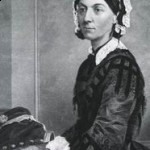The Crimean War (1853-1856)
Category: 19th centuryThe fifties celebrated the triumph of British prosperity in the Great Exhibition. With all this went powerful activity — intellectual, literary and religious, but not military. Yet England was about to become involved in European war for the first time in almost forty years.
Tzar Nicholas I of Russia wished to profit from what he felt to be the imminent disintegration of the Turkish Empire. In 1853 he attempted to gain territory in the Balkans from the declining Ottoman Empire. The Tzar thus hoped to gain an outlet to the Mediterranean Sea. Fearing Russian expansion onto the Balkan Peninsula, Great Britain, France and Austria joined the Ottomans in a war against Russia.
England entered this war between Russia and Turkey on the side of the Turks because Russia was seeking to control the Dardanelles and thus threatened England’s Mediterranean sea routes. The country might not have gone to war had it not been so popular, patriotism being inflamed by such works as Charles Kings-ley’s “Westward Ho!”
The Emperor Napoleon III of France wanted alliance with England and glory. Lord Aberdeen’s government, with enthusiastic popular support, drifted into war, cause for which was found in the Tzar’s claim to recognition as protector of all Christians under Turkish rule. It took place in the Crimea (1854-1855), where the object was to capture Sebastopol, Russia’s chief naval base in the Black Sea.
The misunderstood order that lead to the suicidal Charge of the Light Brigade (by a brigade of light cavalry over open terrain against well-defended heavy artillery) was unfortunately symptomatic of the inept-ness of the British command. Bad planning and incompetent leadership on all sides characterized the war, leading to large numbers of casualties.
The army’s problems were made public by the first real war correspondent, William Russell of the London Times. (Other outrages included the inability of the supply corps to get food to starving soldiers.) The exposure lead to reform. As the enemy killed fewer British soldiers than starvation and cholera, so the gallantry of the Light Brigade was less consequential than the actions of Florence Nightingale, who reformed the way the hospitals were being run and invented the nursing profession.
Florence Nightingale worked in British field hospitals and exposed the wretched and unsanitary conditions she found there. As a result of her efforts to provide better medical care for wounded soldiers, she became renowned as the founder of modern nursing.
Overwhelmed by the western European powers, Russia admitted defeat in 1856. Under terms established at the peace conference, Russia lost her influence in the Balkans. Otherwise, few territorial changes resulted from the Crimean War.

